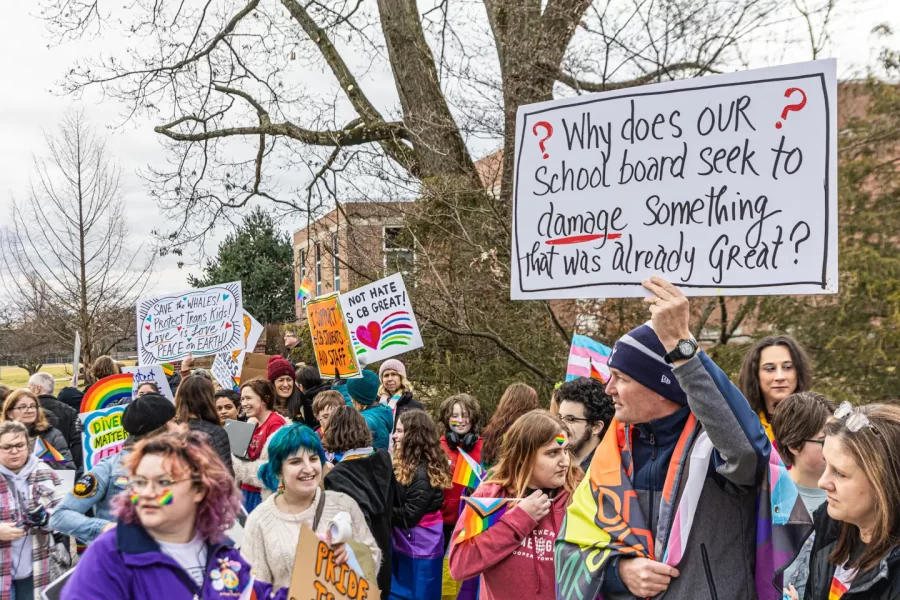In education, a misalignment of interests
What happens when the interests and ideals of teachers and administrators don’t align with the policy of elected officials like school board representatives?
Photo by Kevin Crawford Imagery.
Central Bucks School District students practice joyful resistance to Policy 321 Friday outside of CB West High School.
A school district cannot thrive without beneficial relations with the community it represents.
The need for adherence towards the interests of students and teachers in terms of policy, budgets, and climate, and implementing policy based on such aspects is paramount in fulfilling the role.
However, as recent national and local headlines alike display, the bitter misalignment of defining how to forefront the best interest in question of students at the hand, with pointed fingers, of school boards and administrators has caused a rift between the two bodies.
Recent incidents like that in the Central Bucks School District, with the implementation of Policy 321, banning the display of all “political” insignia in classrooms, including Pride flags, exemplify some of the misconstrued student-need-centered policies finding no backing in the actual wants or needs of administrators and students. Teachers and students have heavily protested the motion, calling out the very body that was elected to represent them.
The unfolding of this contentious political debate revolving around the interrelations of these boards and the students, teachers, and community members they are organized to represent has reached an unprecedented intensity.
While he doesn’t see it as his position to comment on the actions of neighboring school districts, Dr. Todd Bauer, Superintendent of the North Penn School District, views cooperation and willingness to work together to be essential between a board and the school staff it represents.
I think the prerequisite skill to be a successful school board member is to be willing and eager to learn and to be student-centered,
— Dr. Todd Bauer- NPSD Superintendent
“I think the prerequisite skill to be a successful school board member is to be willing and eager to learn and to be student-centered,” explained Dr. Todd Bauer, Superintendent of the North Penn School District.
Teachers should have faith in the governing body that represents the best interest of themselves and their students. When they are asked to ignore and diminish the identities and needs of the pupils they teach, all while being urged to withstand their own moral compasses in addition, optimism in the future of their roles in public education can fall short.
“I’m a firm believer in working for an organization that aligns with your own personal and professional values,” asserted Dr. Bauer.
“If I didn’t align with the values of the organization or the people that work here, live here, or the people that govern us, I think I would look elsewhere to work because I would want to be proud of who I’m working for and who I’m working with and what we stand for,” he further expressed.
Policing the classrooms of those who uplift and keep structure to the educational institutions a school board represents, all while implementing provingly unpopular policy for reasons not validly pertaining to the betterment of teaching as a whole, is the foundational opposite of what school boards are designed to uphold.
No teacher should feel unheard in their sentiments of what will benefit their own learning environments, nor should they be caused to question the fundamentals of why and what purpose teaching still instills for them.
“If I thought [oppressive board policy] was permanent, I would leave… I would seek a place where I thought I could support my students as needed, particularly my more marginalized students,” Dr. Dave Hall, Social Studies teacher and advisor for the North Penn Rainbow Alliance said.
If I thought [oppressive board policy] was permanent, I would leave… I would seek a place where I thought I could support my students as needed, particularly my more marginalized students
— Dr. David Hall- NPHS Teacher / Adviser - Rainbow Alliance
When policies rooted in predisposed political narratives carry out their inevitably intolerant pathways, students and teachers face the tumultuous repercussions they cause..
Instead of districts such as Central Bucks finding ways to justify their repressive and severely out-of-touch policy in the face of insurmountable backlash, acknowledging wrongs and collective efforts to reach the needs of at-risk marginalized students remain the factual way of bettering student morale.
The failure of a board to acknowledge the harmful pretenses their proposed actions and policy can cause stems from the ultimate factor of privilege. Refusing to recognize the negative effects inherently damaging student and teacher interrelations can cause comes from a significant place of privilege. It’s important for school boards to actively listen to the concerns and feedback of students and teachers to create a positive and successful learning environment. When schools create a culture of open communication and collaboration, they can foster trust, engagement, and academic success.












